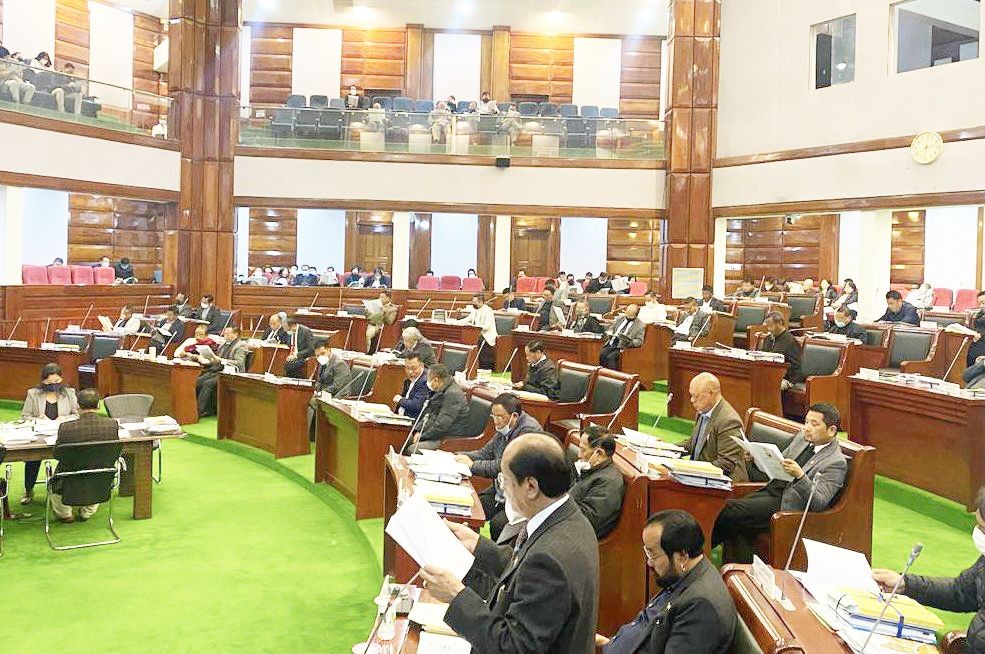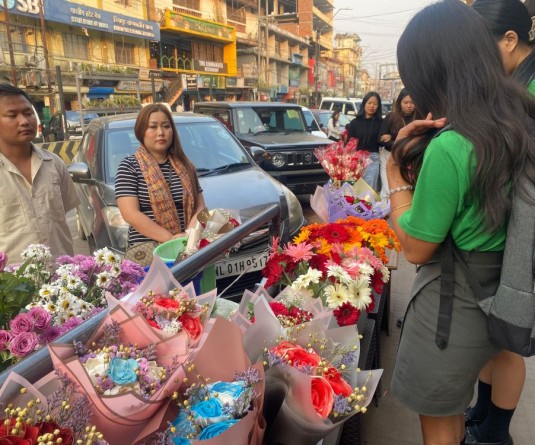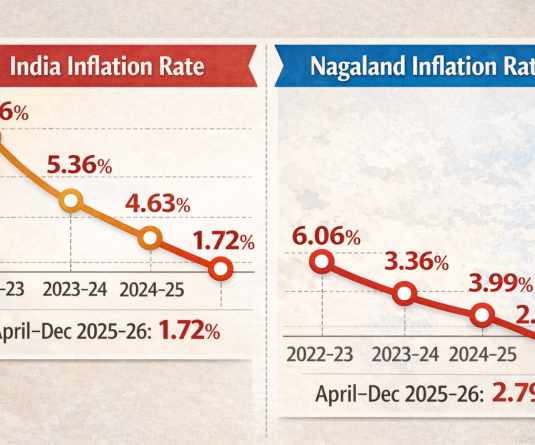Nagaland Chief Minister Neiphiu Rio addressing the Eighth Monsoon Session of the Nagaland Legislative Assembly on August 3. (Photo Courtesy: Twitter/@SecyGeneralNDPP)

Moa Jamir
Dimapur | August 21
An ‘opposition-less’ government in Nagaland, after many days of speculation, was formalized on August 16 with the ruling People’s Democratic Alliance (PDA) and the opposition Naga People’s Front (NPF) signing a pact in the ‘interest of finding a solution to the decades-old Naga political issue’.
The decision for the formation of new dispensation called ‘Nagaland United Government’ (NUG) was taken “unanimously by the primary PDA partners namely NDPP and BJP including two Independent MLAs…,” read a resolution released in the public domain on August 16.
Earlier, the NPP called it a ‘gimmick’ while the NPCC accused the NDPP and NPF of “using Naga political issue as dog whistle” to put other issues of “governance into cold storage and exploit the benefits of power.”
Déjà vu and other concerns
Nagaland had been on this road before in 2015, when eight Congress legislators joined the then NPF-led Democratic Alliance of Nagaland headed by former Chief Minister and ‘present’ leader of opposition, TR Zeliang.
Not surprisingly, the objective then was also to strengthen efforts to “find a solution to the Naga political problem.”
Ergo, it was déjà vu for many; a sense that was reflected responses to the latest Morung poll: Do you support the idea of having an opposition-less government in Nagaland?
Only 7% endorsed the idea, while two-third (67%) of the respondents opposed it. The rest (26%) opted for ‘Others’ but most response suggested disdain for the ‘opposition-less’ government.
Minority of readers endorsing the idea cited display of ‘unity of our uniqueness to the world,’ and working together diligently for changes as well as ‘Naga Nation’ as justification.
An overwhelming majority, however, opposed the idea, and many simply likened it to monarchy, dictatorship, and political opportunism. Others objected citing the principle and essence of democracy, an effective opposition as well as checks and balances.
“This is not the first time that a group of opposition legislators has decided to join the treasury bench in Nagaland. It is nothing more than a publicity stunt. Why can’t the legislators respect the mandate of the people…,” a reader noted.
Others feared that corruption may increase further saying, “There is already huge corruption in Nagaland. So if there is no opposition then it might even get worse.” Another called it “nothing short of a farce.”
‘Questionable’ justification
For many, the very justification given for the formation was questionable. “That means if they are in opposition they are not supporting the Naga cause, and if they are on the ruling side they are supporting? Opposition-less government has nothing to do with the Naga Talks,” commented a reader.
Another rued the discarding of people’s electoral mandate. “Opposition or no opposition is an electoral mandate and not the assembly’s mandate; and if the people will that the latter or former is needed, then that needs to be adhered to and not the whims of the elected.”
Indicating that the primary duty of the government is voter’s welfare and that the Naga peace talk can persist with stakeholders on different platforms, the reader added: “If we are to have again another opposition-less government, it is better to dissolve the state legislature rather than the time and again chest thumping dialogue ‘Naga Solution Karni aseh Koa (Arobi ekbar try kurisabo koa)’...”
Subject experts concur; raise concerns
Similar observations were made by several subject-matter experts this newspaper consulted for insight.
The formation of the opposition-less government does not augur well for democracy in the State, noted Wetshete Thopi, who teaches political science at Patkai Christian College (Autonomous). “It leaves too many rooms open for the ruling dispensation to do whatever they want with no fear of being held accountable for their acts of omission and commission.”
Leaving aside the fate of democracy, their reason for coming together - to expedite the Naga peace process is anything but genuine and sincere, he opined. “The formation will have little or no impact on the Indo-Naga talks as they are not party to it.”
For Dr Achanger Aier, the formation raised a pertinent question on the working of democracy in Nagaland and makes one seriously wonder “whether parties or governments function from the point of political stability, governance, and socio-economic development” or other issues.
It has been stated that ‘opposition-less government’ was formed in the interest of the public but the core principles of democracy such as “by” and “of” the people, I believe was not taken into consideration, added Aier, who teaches political science at St Joseph University.
Even the choice of the word ‘opposition-less’ is misleading given that it is simply a lack of ‘checks and balances scenario,’ a vital essence of democracy. These same people used the word ‘party-less’ in the recent past and are habitual offenders, stated a Mokokchung-based Assistant Professor of Political Science. “It is manifestation of the need to stay relevant,” she asserted.
It is an issue of democracy, noted Dr Zuchamo Yanthan, former President of Naga Scholars’ Association. “Without opposition in the assembly, the opinions of the people regarding government’s policies will not be articulated,” he said while citing concerns such as passage of bills without scrutiny, and taking of decisions beforehand and being foisted upon the people.
“A critical aspect of parliamentary democracy is that issues like dissent, freedom of expression get a fillip if articulated in the assembly. This impetus will be missing if the assembly presents everything with a unanimous voice. This will have an impact in turn on the freedom of press etc,” Dr Yanthan said.
He further underscored that an important jot of an opposition is to take “critical issues to the streets” and in turn gets the people’s voice on the streets to the Assembly” and expressed apprehension that the functioning of legislative assembly itself would be “severely impacted.”
Adding another angle to the development, the Mokokchung-based Assistant Professor opined, “NPF’s serious probing on mismanagement of some thorny issues is silenced by this conglomeration.”
“Time and chance is the essence. The fear of certain pressure groups of getting their plans sabotaged with the active voice of NPF is real. After all NPF has the most mandate from Nagaland and can make or dislodge the process. The merger might keep NPF occupied under the radar and go ahead with their agenda,” she added.
Highlighting that the “history of horse-trading and shifting of political loyalties” in Naga politics is not new phenomenon, Dr Aier said that this has clouded the existence of a vibrant working democracy and the party functioning itself, which in turn affected the fabric of political socialisation, political attitude, and political participation in Naga society.
“The problem of letting leaders settle things among themselves unmindful of their electorate do not bode well to promote a ‘virtuous circle’ linking ordinary citizens to government with such a development in Naga politics,” he added.
Did ‘opposition-less government’ contribute towards developing the Naga society in any meaningful way, particularly on the Naga political settlement? Dr Yanthan posed, adding, “There is already a consensus in the Naga society regarding a peaceful Naga political settlement.
“In such a context, having an assembly without an opposition does not make sense. A healthy Opposition can in fact focus on other issues affecting the Nagas and help in their speedy resolution,” he added.
“If their concerns of an early solution are genuine, then, the most reasonable and sensible thing to do would have been resigning en masse so as to push forward for an early Indo-Naga solution, unfortunately that’s not there,” Wetshete added.





